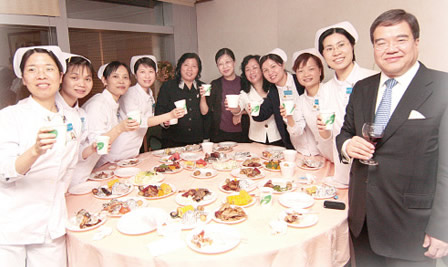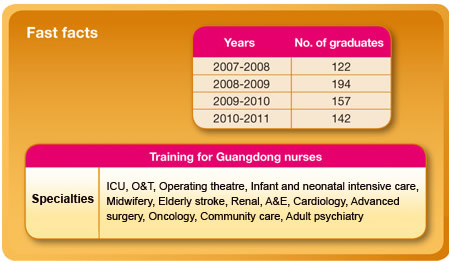


|
||||||||||||
|
From 2007 to 2011, HA has organised for Guangdong nurses four training programmes covering 13 specialties. Each programme lasted for 10 months. A total of 615 Guangdong nurses have successfully completed their training. Dr Eric Chan, Senior Manager (Nursing)/Principal Nursing Officer of HA, who planned and organised the programme, said "Graduated nurses are capable of handling more complicated medical caring."
In 2008, the Sichuan earthquake left quite a number of victims needing orthopedics caring. Some patients, whose conditions were relatively stable, were transferred to hospitals in Guangdong for treatment. "Hospitals in Hong Kong command a high standard in orthopedics caring. The programme offered a much-needed training opportunity to enhance their standards in this regard, so that they could render better caring for those in need."
Thanks to the generous support of all clusters, the programme became a great success with frontline colleagues passing on valuable medical knowledge and giving wise guidance to trainees. "The trainees had good fundamental skills of medical caring. They took learning seriously and absorbed knowledge like a sponge," said Mr Tsang Ka-kit, Queen Elizabeth Hospital (QEH) Nurse Specialist (Orthopeadics & Traumatology) and head of orthopedics training. Another trainer Ms Tsang Siu-ling, QEH Labour Room Ward Manager said, "They have improved by leaps and bounds and were able to share our workloads in many ways. They were respectful and were keen to make great strides."
The training programme was well received by nurses in Guangdong. Every year, there was an average of 500 applicants competing for about 100 places. As English is the medium of instruction in Hong Kong hospitals, and most patients and their family members speak Cantonese, successful candidates were required to have good command of both English and Cantonese, in addition to relevant experiences in their specialties. Selected candidates were required to enrol in an intensive class to brush up their English, especially medical terms. Apart from classes and clinics, teachers also helped trainees familiarise with the new environment in Hong Kong. "We organised activities for them to relax during festivals. To enhance their confidence for examination, we also held tutorial classes for them," said Dr Chan.
"The programme has received generous support from different parties, particularly from HA Chairman Mr Anthony Wu and Cluster Services Director Dr Cheung Wai-lun. All trainees have expressed gratitude to our medical staff concerned". Though the programme has drawn to a close, relevant parties
are actively exploring further collaboration opportunities. Dr Chan
noted: "Guangdong province has huge potential to develop into a
specialty training centre for nurses in the Mainland. We feel proud
being part of the team contributing to improvement of its medical
service."
|
 |
|||||||||||
|
||||||||||||
|
|
||||||||||||
|
|
||||||||||||
|
- |
||||||||||||
|
|
|
|||||||||||


